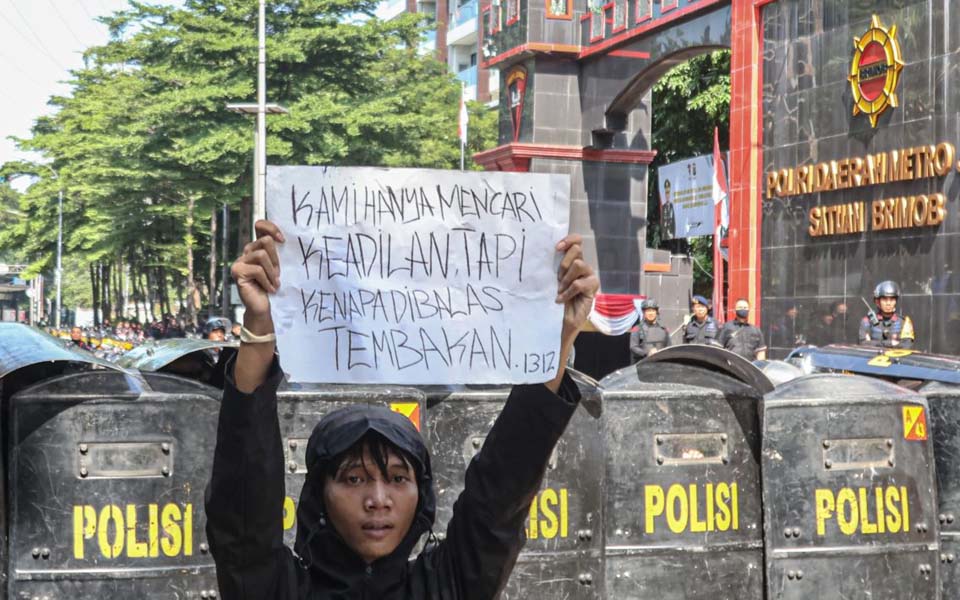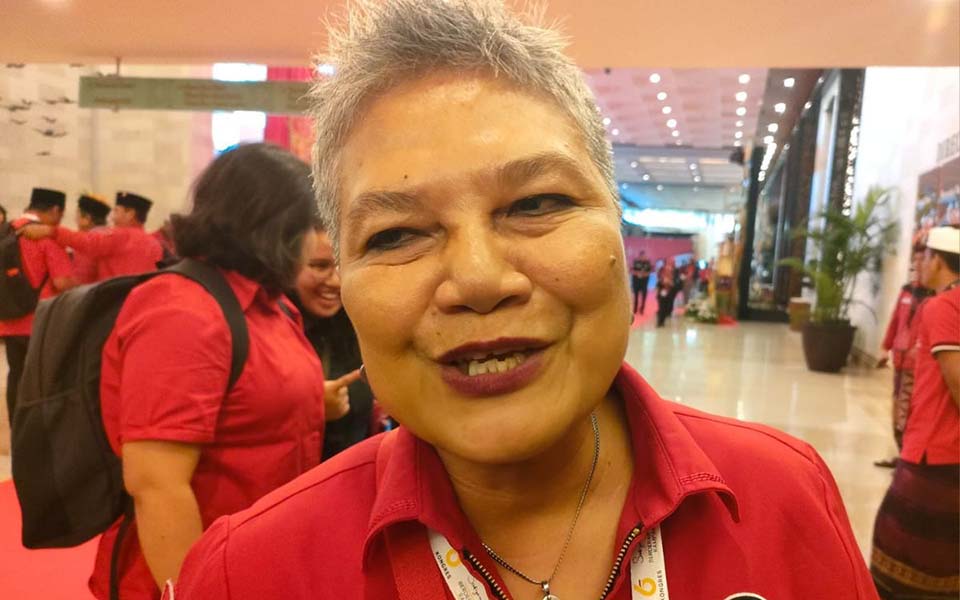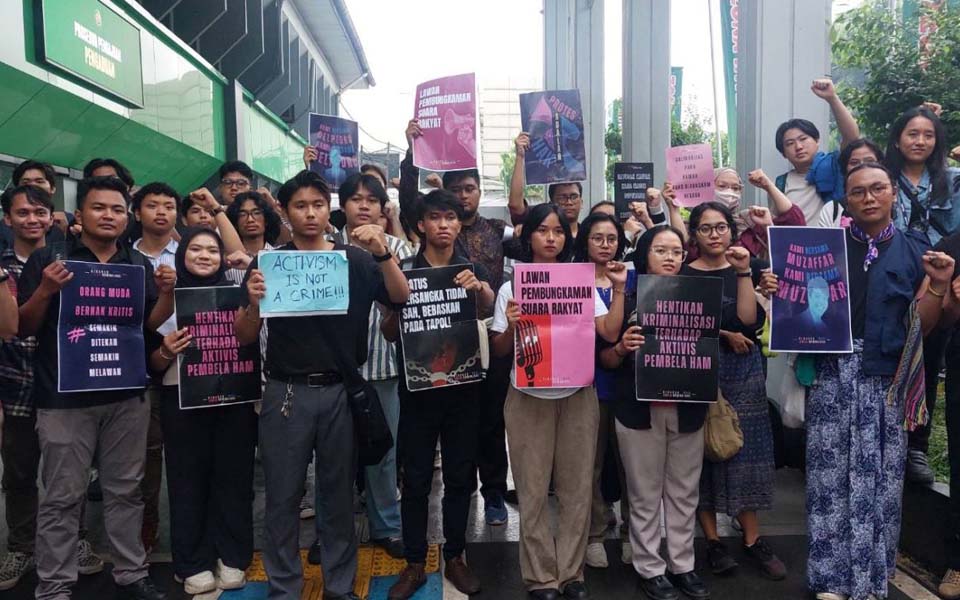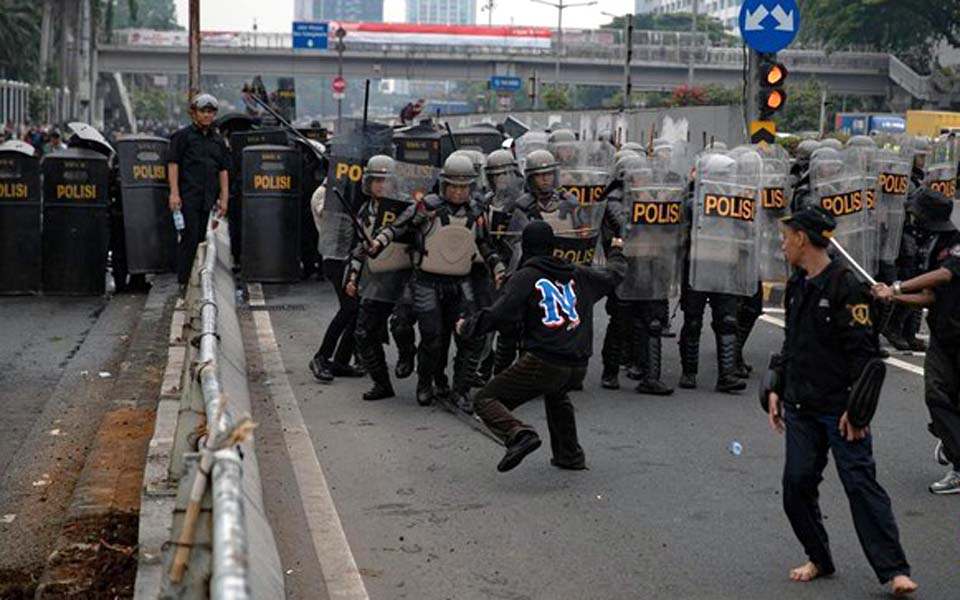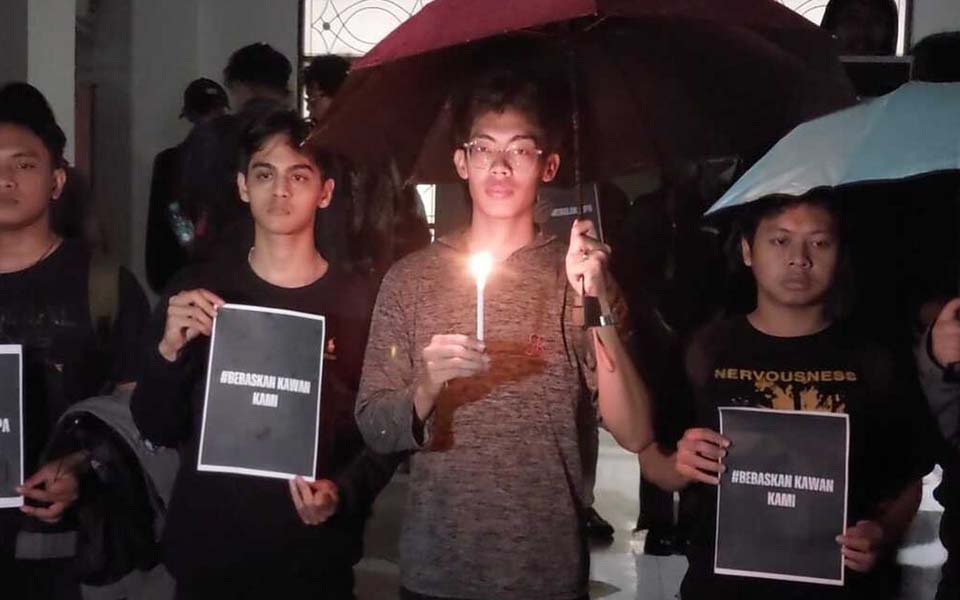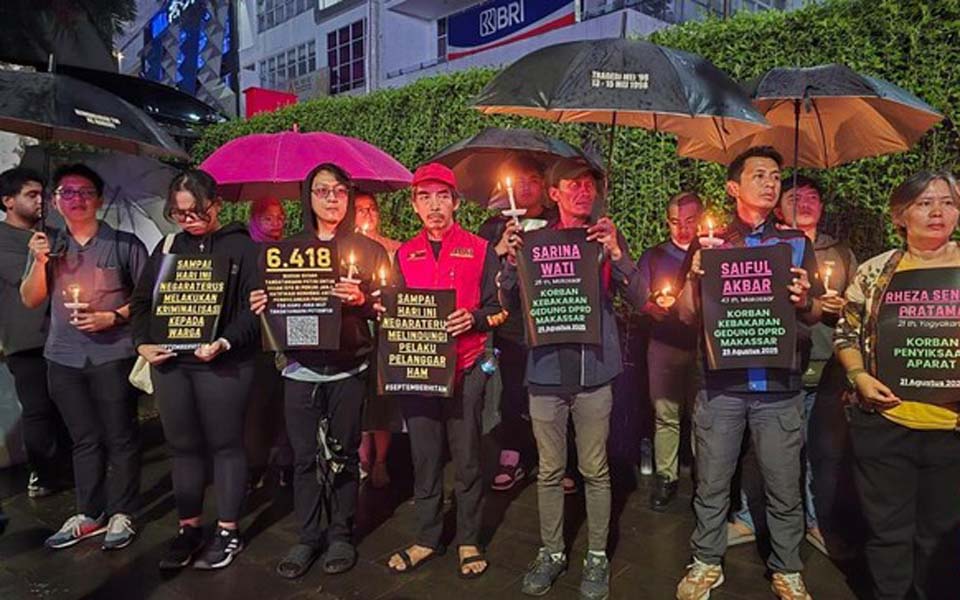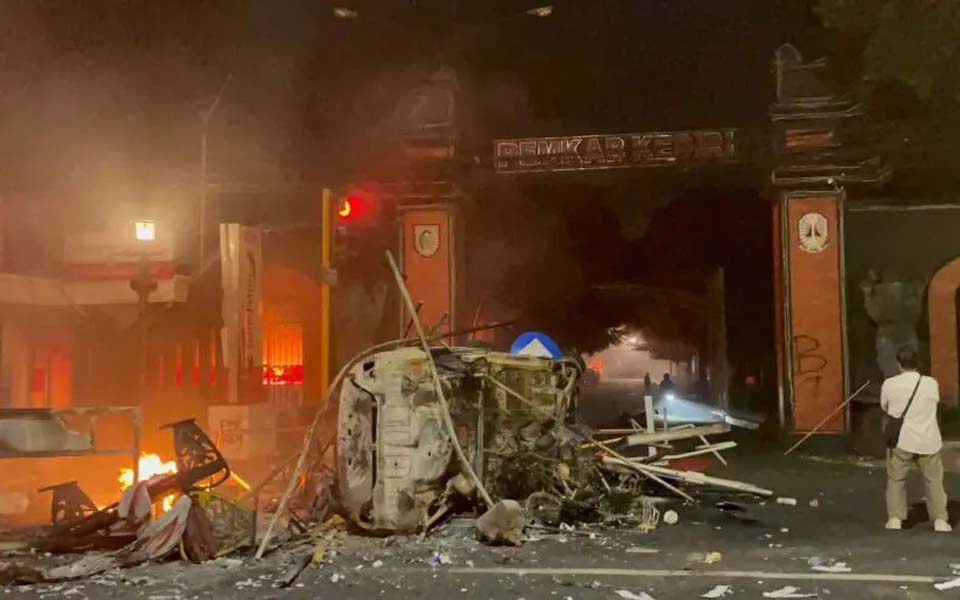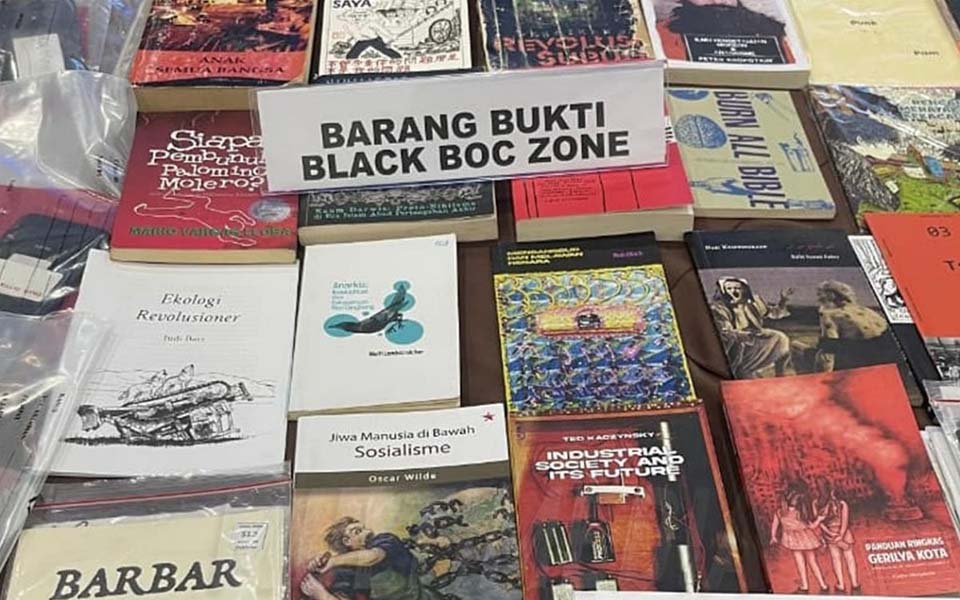Responding to President Prabowo Subianto's press conference today (31/08) and the earlier order by the chief of police to shoot on sight with rubber bullets any protesters attacking police headquarters, Amnesty International Indonesia Executive Director Usman Hamid said:
"Labelling public demonstrations with accusations of treason or terrorism is excessive, especially if it is continuously conveyed with the narrative of 'foreign interference' and 'spreading conflict' when people are demonstrating to voice their aspirations regarding problematic government policies. The president's statement is insensitive to all the complaints and aspirations the people have been voicing during the demonstrations.
Peaceful demonstrations are neither treason nor terrorism. Law enforcement has the authority to prosecute any criminal acts occurring on the ground, but we also need to remind you that all actions taken must be in accordance with the principles of proportionality, necessity and legality that is based on human rights values. The state may not use methods that violate human rights, even in responding to a crime. There are established corridors, and the authorities are obliged to adhere to human rights principles when securing demonstrations.
The emergence of the President's instructions to the chief of police and the commander of the Indonesian Military (TNI) to take firm measures, which were then followed up with a 'shoot on sight' policy against protesters who were labelled as 'anarchists' is something that is quite regrettable.
The state should respond to demands from various people's groups with a series of comprehensive policy changes. For example, reforming the free nutritious school meals (MBG) program, the sovereign wealth fund Danantara, National Strategic Projects (PSN) and the parliamentary allowance policy, which are considered unfair to the people.
The state should also conduct a serious evaluation of the security measures used in the demonstrations, as well as investigate and prosecute all security personnel responsible for excessive use of force, from beatings and arbitrary arrests to the use of a vehicle to run over Affan Kurniawan, resulting in his death.
At the very least the state must conduct an independent and credible investigation. Not just imposing light internal sanctions and reinforcing narratives that marginalise the public with the term 'anarchist'. This policy choice only deepens the pain and widens the gap between the people and the state.
The 'shoot on sight' instruction, even when using rubber bullets, still carries the risk of fatal injuries to victims. This includes the possibility of hitting innocent bystanders, including ordinary citizens who are simply at the scene to find out what is happening.
The President's Instructions to the chief of police could also be dangerous because they obscure the root of the problem, namely the widespread public dissatisfaction with the country's poor and unfair policies. These instructions also appear to mask state repression of critical voices.
In this way, the government appears to be ignoring the fact that protest is a constitutional right of citizens, guaranteed by the 1945 Constitution. Shaping public opinion that demonstrations are synonymous with riots actually narrows the space for freedom of expression and justifies repressive actions.
The national police chief's order to his officers to shoot on sight with rubber bullets people that attack police headquarters following the protests over the death of online motorcycle taxi driver Affan Kurnawan was a wrong and dangerous move.
This instruction arose not from a critical reflection on state policy and the actions of the authorities in handling the demonstrations, but rather from a reactive response to a wave of public anger fuelled by the police's own repressive behaviour. The death of Kurniawan – an innocent victim of the brutality of a paramilitary police Mobile Brigade (Brimob) tactical vehicle – has become a symbol of the state's failure to implement fair policies for the people and to ensure that the authorities serve and protect their citizens.
The state does indeed have the authority to take action against vandalism or looting, but such actions must be carried out in a measured, accountable manner, and in accordance with human rights principles. The state must not participate in inciting emotions and resort to the use of firearms as a response to the people's anger.
What's more pressing now is a comprehensive evaluation of state policies affecting the socio-economic well-being of the people, such as increases in land and building taxes, the MBG program, lavish allowances for government officials, the expansion of the military's role in non-defence matters and improvements in public welfare. These are the issues that the ordinary people have been critically voicing.
At the same time, the state should immediately improve its security practices for demonstrations to ensure a humane approach. Only then can the state truly act as a protector, not an oppressor of its people.
Don't divide society by claiming that the demonstrations are part of an effort to divide the nation. Listen to their aspirations and prioritise a human rights approach in responding to every demonstration."
Background
Media reports today said that the Indonesian National Police Chief General Listyo Sigit Prabowo in a video conference (vidcon) asked the police to shoot using rubber bullets if police headquarters were breached by the masses. This is related to the mass demonstrations in front of the Brimob Headquarters (Mako Brimob) in Kwitang, Central Jakarta, over the past few days following the death of Kurnawan after being hit by a Brimob tactical vehicle (rantis) on Thursday August 28. Mass demonstrations that ended in clashes with police have also taken place at police headquarters in several cities since Friday August 29.
"So starting today, it is forbidden by law for [police] headquarters to be attacked. If they attack and enter, regulations already exist. Apply them. If they enter a dormitory, shoot first. If you have rubber bullets, shoot, at least in the legs. Don't hesitate. If anyone blames you, report them. Listyo Sigit is ready to be removed from office", were the instructions by the police chief in a video circulating on social media on Saturday August 30.
In addition to this, on August 30 President Prabowo ordered the chief of police and the TNI commander to take firm action in dealing with anarchistic demonstrations after a tendency emerged over the last two days for demonstrations in several cities to turn into riots with the burning of buildings, public facilities and attacks on police stations.
From Saturday afternoon to early Sunday morning, news also emerged of the looting of homes belonging to of several members of the House of Representatives (DPR), including Ahmad Sahroni, Eko Patrio, Uya Kuya and Nafa Urbach. Finance Minister Sri Mulyani's home was also the target of looting.
[Translated by James Balowski. The original title of the article was "Negara harus evaluasi menyeluruh kebijakan yang merugikan rakyat, jangan labeli aksi demonstrasi dengan tuduhan makar dan terorisme".]





